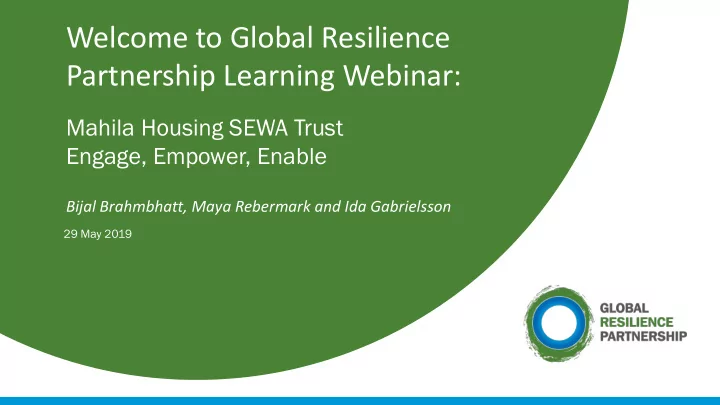

Welcome to Global Resilience Partnership Learning Webinar: Mahila Housing SEWA Trust Engage, Empower, Enable Bijal Brahmbhatt, Maya Rebermark and Ida Gabrielsson 29 May 2019
Agenda Speaker Ms. Bijalben Brahmbhatt, Director Introduction to learning Mahila Housing SEWA Trust webinar series 14:00 – 14:30 Webinar series content Questions or comments Introduction to MHT Presentation by Bijal Group discussion 14:30 – 15:00 Presentation continued Q&A with Bijal Closing comments & next webinar
Mahila Housing SEWA Trust Engage, Empower, Enable Working since 1994 to mobilize women in poor communities and enable access to improve habitat services, housing, and land rights
Key Issues Identified by Mahila Ample initiatives for rural poor Urban poor still facing challenges: • Inadequate urban planning • Slum communities are not sufficiently recognized as city residents Slum Communities caught in “Poverty trap” due to multiple deprivations Climate Stresses a “Slow but Potent Disaster” Add Gender Discrimination Women from Slum Communities are most vulnerable to Climate Change while having least adaptation capacity
The Barriers Institutional Information Barriers Barriers Technology Financial Barriers Barriers
The Program Reaching 25,000 Most Vulnerable Families Water & Heat Water Flooding & vector borne Scarcity Inundation Stress diseases
The Objectives 1 2 3 4 Targeted Piloting and Designing and Creation of Training and community incubating strong localized validation of financial Institutional communication technical products. Partnership. strategies for solutions related behavior change. to stresses.
Training Delivery for Climate Change: Objective 1 Understanding Concepts, Risks and Resilience Building Module on Climate Change Risks & Resilience Measures Expected Learning Outcomes Vulnerability of Slum Dwellers & Informal Settlements Causes and impacts of climate change Vulnerability of Women Role of women as agents of climate change adaptation Methodology Animated visual tools Participatory games Posters Story telling
Participatory Toolkits Developed Objective 1 Root Cause Identification and Interconnections
Objective 2 Community Based Surveillance Training Simplified and assembled toolkit for community use Awareness generation of the community regarding water quality and weather situations in slums Hands-on training to capture real-time slum level data
Community Based Surveillance Toolkit Components
Impact of Trainings Climate change no more an “Act of God” Realizing “the most vulnerable” sections In-depth understanding of science behind climate change and subsequent risks as well as inter-linkages, getting a futuristic perspective Increase in knowledge seeking behavior: demand for water testing, vector drives Small changes leading to big health and economic gains Behaviour change at household level: boiling water, mosquito repellent usage, etc Behaviour change at community level: solid waste management, cleaning of drains
Increase in investment practices Objective 3 Modular Roofing System Impact Around 300 households have invested in modular roofing system 1500 people have benefitted with this climate resilient solution
Objective 4 Creation of Strong Institutional Partnerships Multi-stakeholder events organized in each project city Identification of over 280 local experts and stakeholders Major City level Partnerships: Ranchi- Municipal Corporation for Rain Water Harvesting and PMAY Jaipur- Elected Representatives, PHED, Local University, CSO Bhopal- RAWS-India, Malaria Department Ahmedabad- Real Estate Developers, Municipal Corporation (Heat Action Plan)
The Outcomes Improved investment practices of 3338 poor families at household and community level Increased knowledge of 27,227 women reached through multiple communication and training activities 8,165 women demonstrate change in knowledge seeking behavior Increased social capital of 27,055 families in 107 slum communities through 114 CBOs/ CAGs Vikasini Ahmedabad shared their project insights, some of which have been incorporated in the City Heat Action Plan 2017 Increased sphere of influence of 1,604women leaders on local policies through five Vikasinis; City level Federation promoted in Ahmedabad, Bhopal, Jaipur, Ranchi and Bhubaneswar. Three of these are established, while two are emerging Vikasinis
Improvement in Individual Stressors for Treatment Households Water Heat Social Water quality Flooding Health quantity stress capital No. of HHs in which 424 339 162 224 253 224 risk has Decreased % of HHs in which risk 61.8% 49.4% 23.6% 32.7% 36.9% 32.7% has decreased 72.3% of HHs have reduced risk by 20% for two or more risks/susceptibility classes 21.7% of the HHs have reduced risk by 20% or more for one of the risks/susceptibility classes Statistically significant decrease in the risks (p<0.05) for Water quantity risk, water quality risk, Flooding risk, Heat stress risk and Social capital susceptibility.
To learn more, get in touch with us! MHT Mahila Housing SEWA Trust 701-702, 7th Floor, Sakar – 4, Opp. M.J. Library,Ellisbridge, Ahmedabad-380006Gujarat, India +91 79-26587725, +91 79-26587726, +91 79-26587728 www.mahilahousingtrust.org info@mahilahsg.org Mahila Housing Trust-MHT @mahilahsg
Thank you & contact us MRebermark@globalresiliencepartnership.org IGabrielsson@globalresiliencepartnership.org
Recommend
More recommend